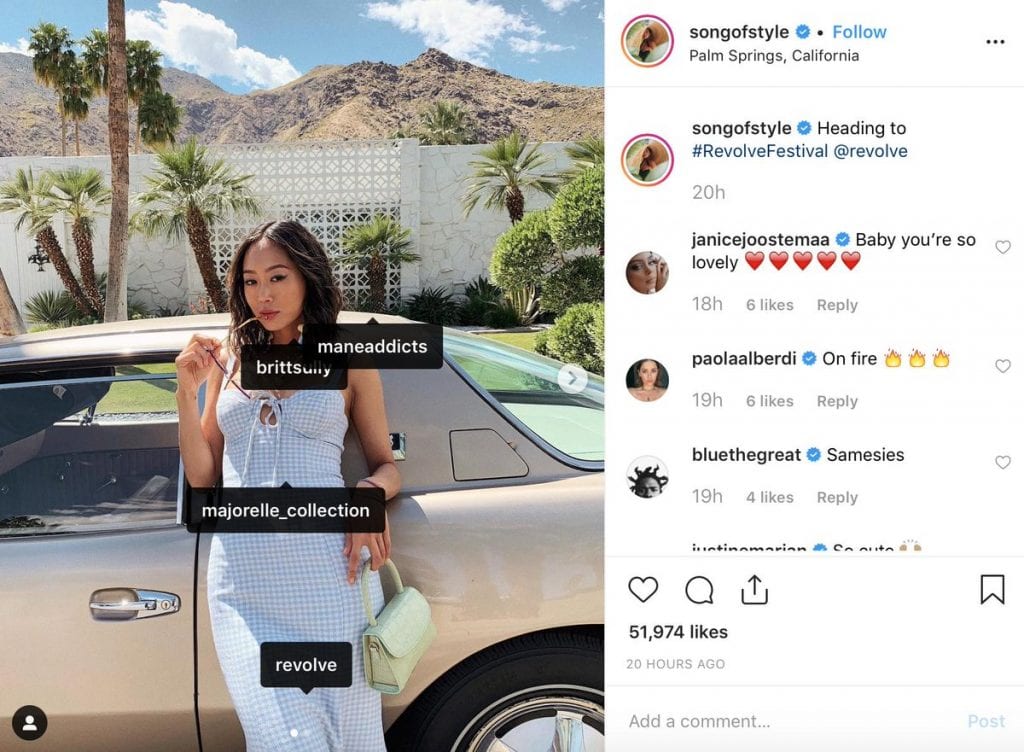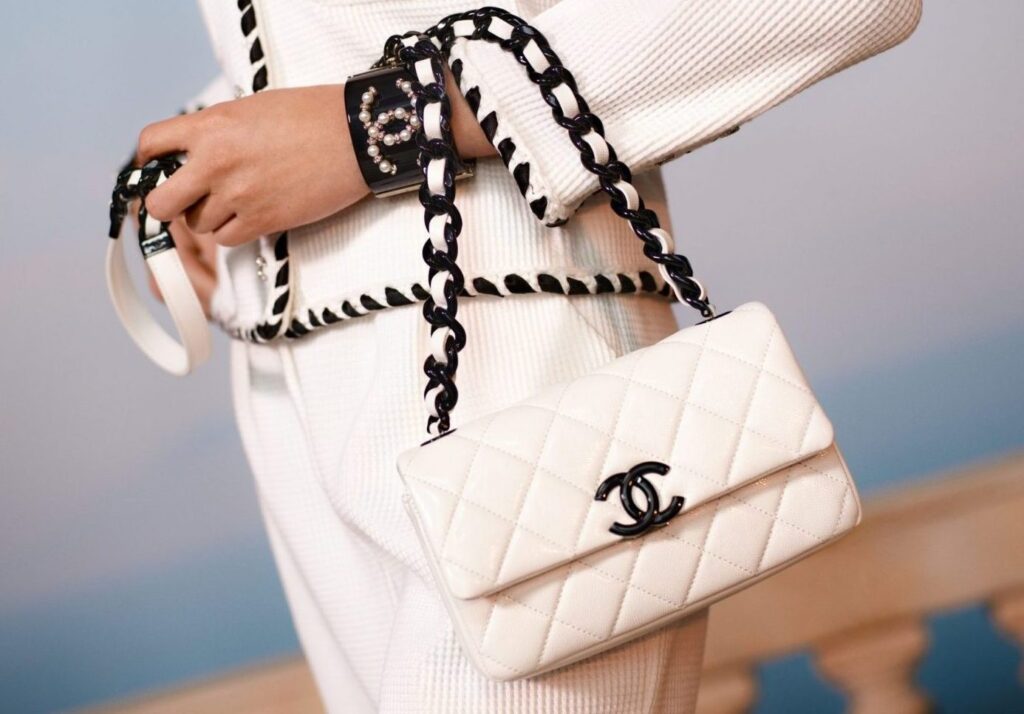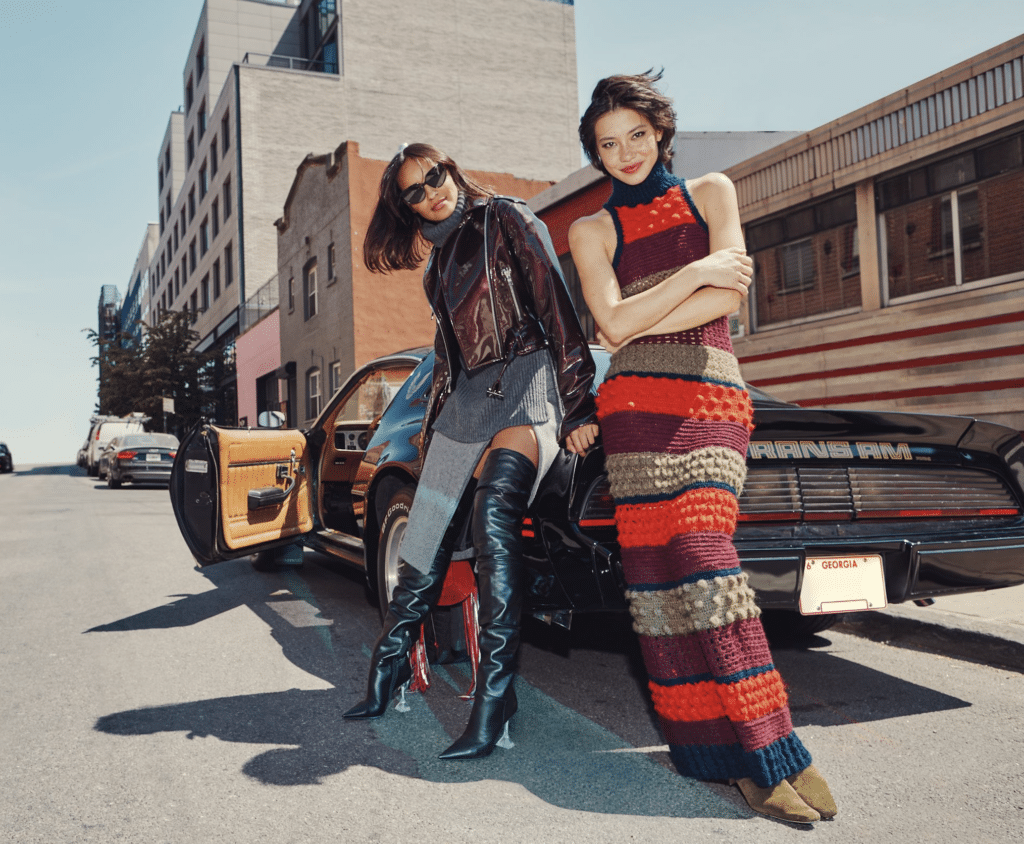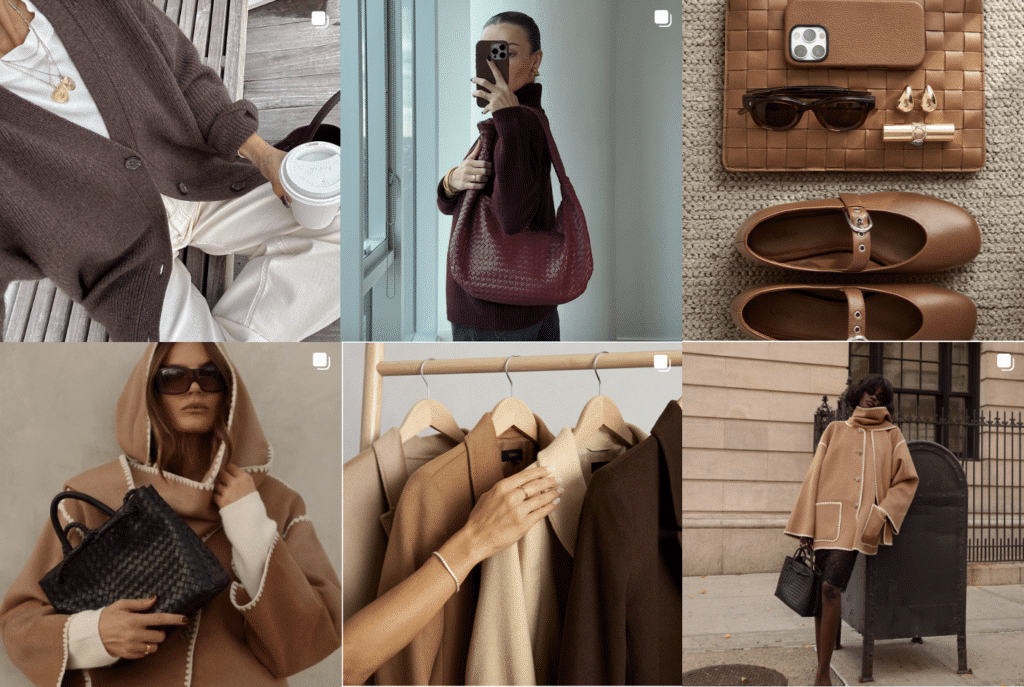Raissa Gerona’s Instagram account is jam-packed full of imagery of her dining alongside Chiara Ferragni in Milan, partying at the Ritz Paris with Julie Sarinana and Negin Mirsalehi, frolicking in front of the Eiffel Tower with Belen Hostalet, or at Coachella with Kaia Gerber, on a beach in Spain with Chriselle Lim and Camila Coelho, and sitting poolside in the Hamptons amongst a bevy of influencers, whose collective follower count tops 30 million.
As Revolve’s vice president of brand marketing and strategic partnerships, Gerona’s job includes, at least in part, forming close-knit bonds between the rapidly growing e-commerce site and the fashion industry’s most highly-followed influencers. In short: She is tasked with ensuring a constant stream of Instagram endorsements for the e-commerce retailer from the industry’s most famous influencers, who, in most photos are wearing – and tagging – garments stocked and immediately shoppable on Revolve’s site and those of its stable of (not necessarily obvious) in-house brands, including Lovers + Friends, Tularosa, NBD, Raye, Privacy Please, L’Academie, Grlfrnd Denim, Majorelle, and h:ours.
For Revolve – which was founded in 2003 by Michael Karanikolas and Michael Mente – influencer marketing is huge business. As WWD reported in October, up to “70 percent of current overall sales at revolve.com are driven by an influencer. And based on projections that Revolve was on track to surpass $1 billion in retail sales [in 2017], that means that content creators could be responsible for up to $700 million of [2017]’s revenue.” In its October 2018 IPO filing, Revolve revealed that it has “built a community of over 2,500 influencers and brand partners, including many of the most influential social media celebrities in the world, whom we track and manage using our proprietary internal technology platform.”
This gives rise to something worth examining: The majority of the influencer-posted Instagram content promoting Revolve lacks the disclosures that are mandated by U.S. federal law, requiring the “clear and conspicuous” identification of the relationships or material connections that go on behind the scenes.
#RevolveAroundTheFTC
For the uninitiated, the Federal Trade Commission (“FTC”) has long required advertisers and promoting parties, alike, to disclose material connections so that consumers can make purchasing decisions accordingly – and such guidelines extend to the web and social media, alike. This means that if a brand or retailer compensates an influencer to post about it or its products online, or to tag its products on Instagram, for example, that must be clearly indicated. #Ad and #Sponsored are common examples of such disclosure language.
Similarly, if an influencer is gifted products from a brand or retailer (even if the brand/retailer does not explicitly require or pay for endorsement in exchange) and the influencer does, in fact, post a photo or video that depicts the product, that connection must also be disclosed. This logic extends to instances in which a brand/retailer pays for an influencer’s trip to attend an event, such as Coachella or a fashion week show.
Still yet, the FTC has stated that affiliate-type relationships – aka when an influencer earns a commission by promoting others’ products, usually by including a link in their bio line on Instagram, for example – must also be disclosed. And these disclosures must be repeated; in other words, disclosing once is not enough.
This is where Revolve appears as though it might be running afoul of the law. In reviewing the disclosure behavior of top influencers in connection with Revolve last year – including Chiara Ferragni; Aimee Song of Song of Style; Amber Clark of Barefoot Blonde; Christine Andrew of Hello Fashion; Julia Engel of Gal Meets Glam; Julie Sariñana of Sincerely Jules, and Rachel Parcell of Pink Peonies – New York-based digital research firm L2 uncovered 142+ instances in which posts included Revolve hashtags, such as #revolveinthehamptons, #revolvefestival, #hotelrevolve, #revovlearoundtheworld, etc.
According to L2, very few are indicated as sponsored. Mike Froggatt, a director at L2 told WWD, “Of these Revolve-related posts, only nine were identified as an ad — Song with six of these, Bernstein with two and Ferragni with one — even though the majority of these influencers work closely, and in a paid capacity, with the retailer.”
Our own research confirms these findings from L2. In reviewing over 41,000 Instagram posts (and in some cases, related Twitter and Facebook posts) by over 50 different influencers (we ultimately highlighted 25 of them) between July 1, 2017 and December 31, 2017, we found that less than one quarter of all Revolve-related Instagram posts were disclosed as sponsored content.
It is also worth noting that of these various trips, no shortage were hosted at Aman resorts, making it unclear as to whether there is also a material connection between Revolve and the international luxury hotel group.
More recently, WWD indicated that Revolve’s summer activation in Bermuda — which sees the retailer treating more than 75 influencers “to an agenda of brunches, pool and beach parties, outdoor movies, yacht trips and sightseeing in St. George, all with the goal of getting them to play up the activities on social media. That’s on top of events that will tie in brands partnered with or part of the Revolve portfolio, such as LPA and Adidas by Stella McCartney” — “includes a partnership inked with the Bermuda Tourism Board and a partial takeover of the Rosewood Bermuda.”
Free Trips, Free Clothes, and Big Checks
What content are we talking about, exactly? Well, according to Los Angeles-based creative agency, Mistress, “Rather than opt for the route of shooting traditional fashion editorial ads, Revolve began regularly hosting getaway trips from Palm Springs to Croatia, inviting influencers to relax, hang out and have fun while posting images of themselves wearing Revolve clothing (oftentimes with links to purchase the items) and the hashtag #RevolveAroundTheWorld.”
But there is a lot more going on here than one-off trips and affiliate compensation schemes. According to a source of Fashionista, “In addition to taking care of their travel and accommodations, Revolve gifted each influencer [including Natasha Oakley, Chiara Ferragni, Eleanor Calder, Kristina Bazan, Negin Mirsalehi, and Camila Coelho, among others] with a sizable clothing credit — a source close to the participating talent tells us $2,000 is standard — in addition to paying his or her appearance fee.”
In exchange, “Each guest was required to post using the designated hashtags twice per day.”
It is worth noting that the form that the relationship between Revolve and its influencers takes – whether it consists of straightforward payouts, affiliate-type situations, lent or gifted garments and accessories that are available for sale on the Revolve site, or some combination of these different instances – does not matter. The FTC has said that all of these situations likely fall under its purview and thus, require disclosure, as long as a “significant minority” of consumers is likely to be misled as to whether the parties have a connection and the extent of that connection.
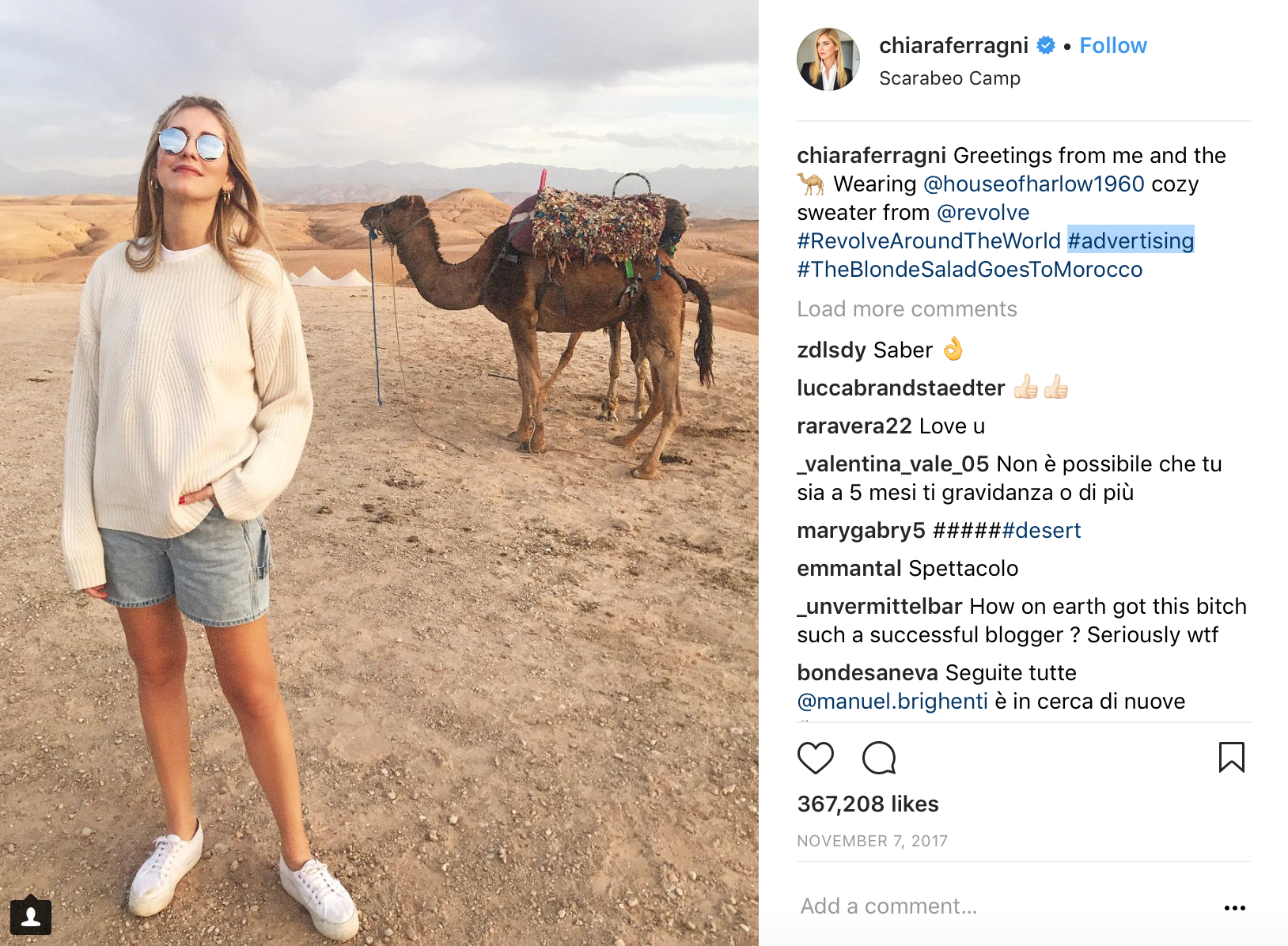 image: @chiaraferragni
image: @chiaraferragni
Moreover, even if these influencers are only contractually required to post twice per day using Revolve hashtags, that does not necessarily mean that any additional brand-specific posts do not require disclosure. According to the FTC, if an individual has a material connection to a brand but was not paid for a specific post, he/she “should still disclose [his/her] connection to the brand.”
Material Connections
While it likely would not otherwise be obvious if – and the extent to which – influencers are compensated by Revolve due to their overwhelming lack of proper disclosure language, there appears to be some evidence that such influencers maintain material connections with Revolve. For instance, Chiara Ferragni, the mega-influencer force behind Blonde Salad has provided some insight into the Revolve model by way of her disclosures. Ever since Ferragni’s business partner was on the receiving end of a letter from the FTC last year, she has changed her ways to an extent and the results have been quite telling.
Posts that previously did not include disclosures now come with #ad language. Some of the newly-disclosed posts include Revolve-related hashtags and other brand-specific tags, such as #RevolveAroundTheWorld, and now include #Ad disclosures, thereby proving that she – and many others – are being compensated in some form.
And even more importantly, Revolve co-founder and co-CEO Michael Mente, speaking of the retailer’s Coachella 2017 event at WWD’s Apparel and Retail CEO Summit, shed light on the model. WWD’s Rachel Strugatz detailed the contents of Mente’s discussion, writing, “For [Mente], the answer [to millennial consumers’ distaste for obvious advertising] became building a network of influencers to join the Revolve family. There are now 5,000 total, with the upper echelon counted as paid partners who travel with and attend events and parties on behalf of the retailer and its host of in-house apparel brands.”
Strugatz further wrote, “Mente detailed the most significant influencer-fueled initiative to date: #RevolveFestival at Coachella this past spring, which he called Revolve’s ‘own music festival.’ Mente maintained that more than five billion press and social impressions were generated during Coachella, where the retailer outfitted more than 700 influencers.”
“That was thousands of outfits,” per Mente.
Very few of those 700 individual influencers clearly disclosed that they were dressed by Revolve or connected with the e-commerce giant in a material capacity as required by the FTC. It is also noteworthy that Revolve’s Coachella event was just one of more than 70 different activations in over 10 different countries in 2017.
That makes for a noteworthy number of Instagram posts that stand to run afoul of the FTC’s guidelines, assuming that a “significant minority” of consumers are misled, and a whole lot of money in the mix, as well.
* This article was initially published in January 2018. The first image has been updated.







